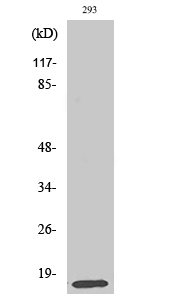
| WB | 咨询技术 | Human,Mouse,Rat |
| IF | 咨询技术 | Human,Mouse,Rat |
| IHC | 1/100-1/300 | Human,Mouse,Rat |
| ICC | 技术咨询 | Human,Mouse,Rat |
| FCM | 咨询技术 | Human,Mouse,Rat |
| Elisa | 1/20000 | Human,Mouse,Rat |
| Aliases | MRPL14; MRPL32; RPML32; 39S ribosomal protein L14; mitochondrial; L14mt; MRP-L14; 39S ribosomal protein L32, mitochondrial; L32mt; MRP-L32 |
| Entrez GeneID | 64928; |
| WB Predicted band size | 16kDa |
| Host/Isotype | Rabbit IgG |
| Antibody Type | Primary antibody |
| Storage | Store at 4°C short term. Aliquot and store at -20°C long term. Avoid freeze/thaw cycles. |
| Species Reactivity | Human,Mouse,Rat |
| Immunogen | Synthesized peptide derived from the C-terminal region of human MRP-L14. |
| Formulation | Purified antibody in PBS with 0.05% sodium azide,0.5%BSA and 50% glycerol. |
+ +
以下是关于MRP-L14抗体的3篇参考文献及其摘要概述:
---
1. **文献名称**: *Structure of the Yeast Mitochondrial Large Ribosomal Subunit*
**作者**: Amunts, A., et al.
**摘要**: 该研究利用冷冻电镜解析了酵母线粒体大 ribosomal 亚基的高分辨率结构,揭示了MRP-L14等蛋白在亚基组装及翻译功能中的关键作用。研究中通过特异性抗体验证了MRP-L14的定位及与其他亚基的相互作用。
---
2. **文献名称**: *Mitochondrial Ribosomal Protein L14 Promotes Cell Growth via Regulating p53 Stability*
**作者**: Kim, S.J., et al.
**摘要**: 本文发现MRP-L14通过抑制p53蛋白降解促进癌细胞增殖。实验采用MRP-L14抗体进行免疫沉淀和Western blot分析,证明其与p53的相互作用,并揭示其在肿瘤发生中的潜在机制。
---
3. **文献名称**: *Impaired Mitochondrial Translation in Cardiac Ischemia-Reperfusion Injury*
**作者**: Christian, B.E., et al.
**摘要**: 研究探讨心脏缺血-再灌注损伤中线粒体翻译功能失调的机制,发现MRP-L14表达水平显著下降。通过免疫组化(使用MRP-L14抗体)和蛋白质组学分析,证实其表达减少与心肌细胞凋亡及能量代谢障碍相关。
---
**备注**:若需获取具体文献,建议通过PubMed或Web of Science以关键词“MRP-L14 antibody”或“mitochondrial ribosomal protein L14”检索,并筛选涉及功能、结构或疾病应用的论文。
The MRP-L14 antibody targets the Mitochondrial Ribosomal Protein L14 (MRPL14), a component of the mitochondrial large ribosomal subunit. Mitochondrial ribosomes differ from cytoplasmic ribosomes, as they specialize in translating the 13 mitochondrial DNA-encoded proteins essential for oxidative phosphorylation (OXPHOS). MRPL14 plays a structural and functional role in ribosome assembly and translation within mitochondria, supporting energy production and cellular metabolism.
Dysregulation of mitochondrial ribosome proteins, including MRPL14. has been linked to mitochondrial disorders, neurodegenerative diseases, and cancer, where altered energy metabolism is a hallmark. The MRP-L14 antibody is widely used in research to investigate mitochondrial protein synthesis, ribosome biogenesis, and mitochondrial dysfunction. Common applications include Western blotting, immunofluorescence, and immunohistochemistry to assess MRPL14 expression levels, subcellular localization, and interactions in cell lines or tissues.
Commercial MRP-L14 antibodies are typically raised in rabbits or mice, with validation in model organisms like humans, mice, or rats. Researchers often use this tool to explore metabolic pathways, study diseases with mitochondrial involvement, or validate gene-editing outcomes (e.g., CRISPR). Its specificity is confirmed through knockdown/knockout controls, ensuring reliable detection in both physiological and pathological contexts.
×